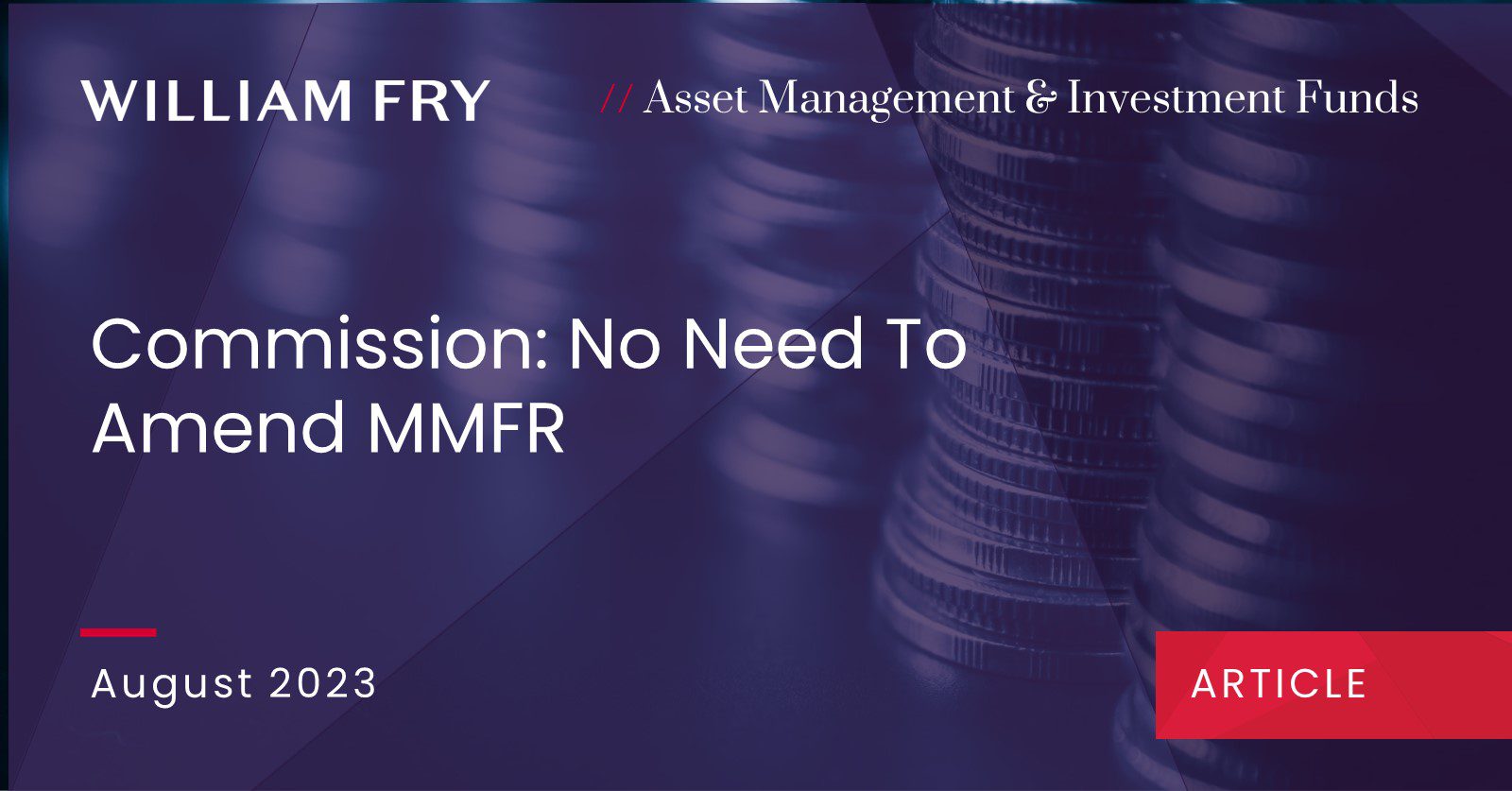Following a scheduled review of the Money Market Funds Regulation (MMFR), the Commission has decided not to amend the MMFR.
In its review findings, published on 20 July 2023, the Commission notes the MMFR has “enhanced financial stability and overall successfully passed the test of the recent market stress episodes.” including as a result of increased interest rates, the UK Gilt crisis, the war in Ukraine, and the COVID-19 pandemic. And while certain vulnerabilities in the MMF market are highlighted by the Commission for further assessment, it awaits the outcome of the ongoing FSB analysis of liquidity in MMFs and the AIFMD/UCITS Review which is expected to ‘further strengthen the resilience of EU MMFs’.
Commission’s MMFR Report
As per previous briefings, ESMA proposed several MMFR reforms, in a February 2022 Opinion, focussing on liquidity and first-mover advantage issues and taking account of ESRB and FSB MMFR-reform recommendations.
The Commission’s recent report includes responses to the reform options tabled by ESMA/FSB/ESRB, a summary of which responses is set out below:
- prohibit use of amortised cost by LVNAVs: the Commission views this option as potentially reducing ‘the effectiveness of MMFs as liquidity management alternatives to bank deposits and limit[ing] the cash-management options of corporates’. In addition, ‘the limited availability of economically viable alternatives and substitutes to LVNAVs [which would disappear if option pursued] could lead investors to turn to less regulated products’.
- decouple LMT use from regulatory thresholds: the Commission is broadly supportive of this option, which it notes has the largest support across stakeholders and ‘could increase the ability of MMF managers to finance increased redemptions in stress periods’.
- relax existing limits on eligible public debt assets as part of liquidity buckets: while the Commission notes strong ECB-support for this option and acknowledges that public debt can serve as a crucial tool to manage MMFs’ liquidity, it equally notes that such investments are not immune to price volatility, as demonstrated by the UK Gilt crisis. ‘There is a risk that an increase in the existing limits on eligible public debt assets would result in MMF investments becoming overly concentrated in these securities, whereas the diversification of investments in different asset classes is an important safeguard.’
- increase minimum holdings of liquid assets generally: while not controversial in substance, the Commission views such proposals as ‘difficult to implement’ and leading to ‘rigidity in the implementation of asset managers’ liquidity risk management policies’.
- give fund managers the possibility to shift the cost of redemptions to investors: while not discounting the FSB/ESRB-recommended option of imposing LMTs/swing pricing, the Commission defers to the AIFMD/UCITS Review proposals which will allow for the selection of ‘the most appropriate’ LMTs from a dedicated list.
- increase the loss-absorption capacity of MMFs: the Commission acknowledges solutions such as constraints on the shares that can be redeemed immediately, and capital buffers would reduce first mover advantage but also that they are ‘either untested and contingent on significant operational adjustments’ or would make MMFs too expensive to operate.
- 80% public debt quota: discounted as ‘infeasible’ by the Commission.
Next Steps
Ongoing FSB analysis of liquidity in MMFs
The FSB is currently reviewing adoption of its October 2021 reforms to enhance MMF resilience. This process is scheduled to complete by end-2023 and will be followed by an assessment of the effectiveness of these measures in addressing risks to financial stability by 2026.
AIFMD/UCITS Review
The Council and Parliament reached agreement on the AIFMD/UCITS Review on 20 July 2023. The text is now subject to formal confirmation before adoption and entry into force by the current target date of end-2023. The Commission expects the AIFMD/UCITS Review to ‘further strengthen the resilience of EU MMFs’.
Contact Us
If you have any queries on the issues discussed in this article, please get in touch with the key contacts, any member of the Asset Management & Investment Funds team or your usual William Fry contact.




